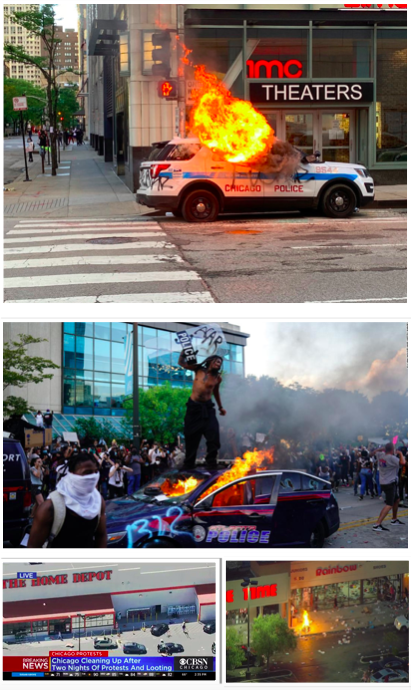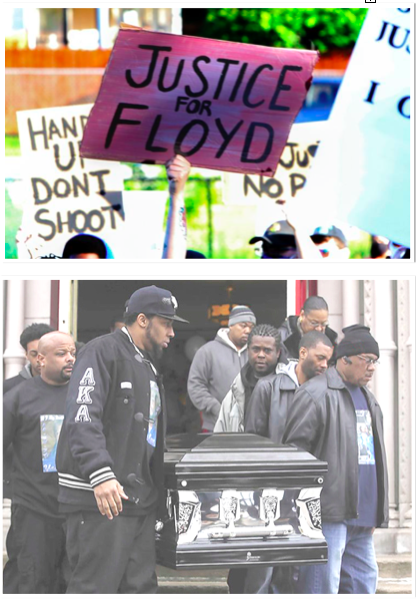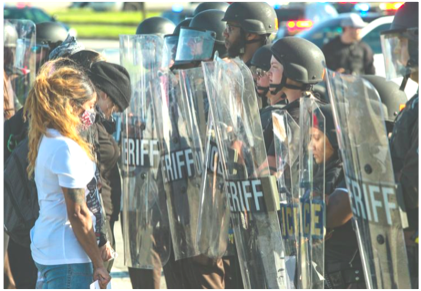Southland Looting and Rooting Out Bad Cops
“In the several conversations I have had with many of my colleagues in Police Administration since protest began, the consensus seems to be that even if we get numerous race bias or brutality complaints against and officer, it is extremely difficult to terminate them on the spot. It takes time and often time there is no quick solution to the problem. “ Markham Police Chief Terry White
By JT Taylor and Barbara Taylor
It was May 25 when by-standers witnessed the last 9 minutes of the life of George Floyd, a 46 year old Minneapolis, Minnesota man. Mr. Floyd’s lay face down on a pavement there while one white police officer kneeled across his neck while other officers looked on, holding him. The nonchalant posture of the officer, Derek Chauvin, with his hands in his pockets struck a nerve after it was learned that Floyd was dead. In a wave of destruction that moved across the country, protest began and the underbelly of America was again exposed to the rest of the world. Looting in major U.S. cities like New York, Atlanta, Chicago and Houston, Texas were broadcast around the world. The suburbs of Chicago, an area dubbed the Southland, was not spared.
[s2If is_user_logged_in()]
River Oaks Mall in Calumet City, Illinois was hit hard as looters, began to break windows and shatter glass in doorways to enter the stores to take items. It was a protest scene the likes that had not been seen since the Rodney King case resulted in the acquittal of officers who were video taped beating the unarmed black man. On April 29, 1992 four officers were acquitted of beating Mr. King repeatedly and severely. Los Angeles went up in flames. Stores were looted and there was arson and murder.
Country Club Hills, Chicago Heights with its now infamous drivers license facility set aflame, Calumet City and Lansing were areas that took the brunt of the frustration of many protesters and agitators. The cost to business and municipalities is not known as yet.
However, residents that have seen this before say this is different.
73 year old Marcus Aldridge, a native of Country Club Hills, told the South Suburban News that back in the 60’s when he protested, it became violent when police began to attack. He shared that it was a non-violent approach and they were trying to stick to that despite the abuse of law-enforcement, but the police attacked anyway.
“They attacked us for walking down a street in towns where our white residents did not want us. We were beaten, bit by dogs, and in some cases killed,” he said.
We felt it was safety in numbers but we had to go back home in towns where the police knew you and how to come and harass you or even worse if they wanted,” he explained.
This George Floyd protest reminds him more of the riots that broke out when noted Civil Rights Activist and Nobel Peace Prize Winner, Martin Luther King was assassinated.
But again this is different according to Aldrigde.
Aldridge says that he and his generation were guided by older leaders. In the current scenario, the leaders are not present and the youth have taken full responsibility for it’s actions. Unabated by police, feared by business owners who want to protect their property and amid the back drop of a national campaign season, young black men and women are making a lot of noise about the treatment they have received by an unyielding climate of division and fear from the highest positions in the country.
According to Sis. Althea Virgin, of Chicago Heights, she agrees that the violence has been pointed in many directions during the protest. She told SSN that she believes that the anger is being fueled by the feeling that black lives don’t matter as much as others and that being oppressed by another race in your daily life has gotten to be too much for men and women who have been cooped up in their home for months due to Covid-19 concerns.
“These police nonchalantly leaning on this man’s neck as if engaged in some leisure activity of killing a black man, was just too much. Some people ask us why you tearing up your neighborhood. This S#!T ain’t ours,” she said.
“Walgreens belongs to them, Walmart belongs to them, Target belongs to them and the DMV belongs to those who continue to oppress us,” she lamented.
Ms. Virgin was asked about the mom and pop stores that occupy some areas that were looted and burned in many towns including the south land. The black owned stores. She was clear that she did not want that to happen, but shared that she feels with all wars there are collateral damages. She said that if she could pick which stores got looted or burned, she would. In the heat of the moment, she said that is not possible.
Thomas Carmicheal, 27 of Calumaet Park, says that the damage to businesses that have continued to do business in the past to make money off of the densely populated areas of the southland (black and brown people), need to make more jobs available. He was referring to big box stores like Target and Walmart.
“As far as I am concerned, if things don’t change we may as well act a fool. The other approaches don’t work. Our politicians on both sides of the aisle are playing games with our lives and some of us aren’t having it,” he said.
This protest is about George Floyd and a lot of other stuff,” he said.
Policing units across America are using lots of resources to deal with the uprisings. Whether the towns are large or small they face the task of keeping the community safe from looters, protecting the rights of protesters and the rights of those attempting to protest the protesters themselves.
According to Markham Police Chief Terry White, a 30 year law enforcement veteran and Markham native, one difference that he can point to regarding change over the past 60 years since the civil rights protest, is the fact the southland has a large number of African American Police Chiefs and city mayors.
“That was not true 60 years ago. Protesters were at the mercy of biased law enforcement departments. It was a different time,”according to White.
He told SSN that the fruits of the labor of the civil rights movement is what we see now in the diverse leadership in law enforcement. Just last month, University Park announced the first African-American Woman Chief in the history of Will County. Deborah Wilson was appointed by University Park Mayor Roudez.
White went on to say that he believes being able to relate to the ire of the protesters and citizens along cultural lines has helped hold the line on looting in his community. What is equally interesting is what White suggested as reason for why it is so difficult to root out, “bad cops”.
He told SSN that despite complaints against officers, it is very difficult to weed them out. He suggested that police officers have protections that make it difficult for police and fire commissions to terminate an officer with out a full blown movement through established protocols. This leaves rogue officers, or those with extreme bias that show in their work, on the streets until a remedy is found.
Ironically, one reader of the South Suburban News wrote this:
“As I looked at photos of the civil rights protest of the 60’s, I see one where a German Shepherd is tearing the pants from the legs of a black man walking. Its a police dog. I was just thinking, that in most police departments, assaulting or killing a police dog by an assailant is punishable by a life sentence. Even the police dog gets more attention regarding his fate than a black man killed by the police in most cases in this country.”










